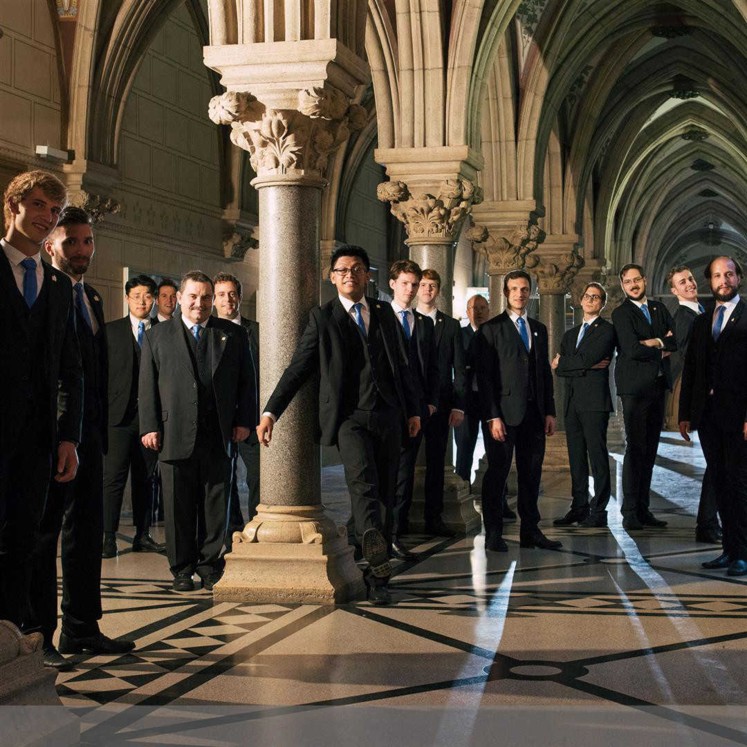
Anton Bruckner, for some time a member and also conductor of the Linz Liedertafel „Frohsinn“, was not alone among composers in feeling a strong connection to the men´s choral societies so typical of the 19th century. Along with most of his contemporaries, including Johannes Brahms, he wrote songs for male choirs about the fatherland, celebrations, nature, hunting, grief and love. The programme complied by the Chorus Viennensis, an entertaining musical journey through life from the cradle to the grave, comes from this fascinating but mainly forgotten repertoire. And humour is not forgotten either!
Anton Bruckner (1824–1896)
Festlied in D major, WAB 59b (1843)
Die Geburt in D flat major, WAB 69 (1851)
Johannes Brahms (1833–1897)
Goldne Brücken (by 1853)
Felix Mendelssohn Bartholdy (1809–1847)
„Hebe deine Augen auf“, from: Elijah, Op. 70, No. 28 (1846)
Robert Schumann (1810–1856)
Zigeunerleben, from: Drei Gedichte, Op. 29, No. 3 (1840)
„Gebt mir zu trinken“, from: Ritornelle in canonischen Weisen, Op. 65, Nr. 4 (1847)
Felix Mendelssohn Bartholdy
Türkisches Schenkenlied, from: Six Songs, Op. 50, No. 1 (1838)
Anton Bruckner
„Lebt wohl, ihr Sangesbrüder“ in A major, WAB 83/2 (1851)
Johann von Herbeck (1831–1877)
Trinkweise (1856)
Peter Cornelius (1824–1874)
Der alte Soldat, from: Three choral pieces for male voices“, Op. 12, No. 1 (1873)
Johannes Brahms
Postillons Morgenlied (1847)
Anton Bruckner
Der Abendhimmel [II] in F major, WAB 56 (1866)
Um Mitternacht [II] in F minor, WAB 90 (1886)
Johann von Herbeck
„Was uns liebt und was wir lieben“, from: Four Songs (1864)
Der Verliebte (1865)
Anton Bruckner
„Heut kommt ja Freund Klose zum Gause“. Canon in C major, WAB 203 (1889)
– Interval –
Johann von Herbeck
Sahara, from: Four Songs (1864)
Hugo Wolf (1860–1903)
Geistesgruß, from: Three Songs, Op. 13, No. 2 (1876)
Anton Bruckner
Zur Vermählungsfeier in D major, WAB 54 (1878)
Robert Schumann
Zur hohen Jagd, from: Hunting Songs, Op. 137, No. 1 (1849)
Johannes Brahms
„Ich schwing mein Horn ins Jammertal“, from: Five Songs, Op. 41, No. 1 (before 1861)
Anton Bruckner
Sternschnuppen in F major, WAB 85 (about 1848)
Träumen und Wachen in A flat major, WAB 87 (1890)
Franz Liszt (1811–1886)
„Ueber allen Gipfeln ist Ruh’“, S. 306/2 (1859)
Anton Bruckner
Am Grabe in F minor, WAB 2 (1861)
Peter Cornelius
„Ach wie nichtig“ in C minor, aufrom: Trauerchöre, Op. 9, No. 1 (1869)
Heinrich von Herzogenberg (1843–1900)
Begräbnis-Gesang in C minor, Op. 88 (1895)
Anton Bruckner
Trösterin Musik in C minor, WAB 81b (1877)
Chorus Viennensis | Male voice choir comprising former members of the Vienna Boys Choir
Michael Schneider | Musical Director